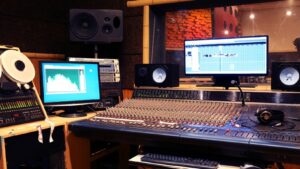In the heart of every unforgettable melody lies the expertise of music sound engineers, the unsung heroes behind the scenes. They ensure every note reaches listeners with clarity and precision, bridging the gap between an artist’s vision and the audience’s experience. By blending technical skill with an ear for detail, sound engineers create captivating soundscapes that inspire.
The Role of a Music Sound Engineer

Music sound engineers optimize audio elements to ensure each note resonates perfectly. Their primary responsibility is to balance, adjust, and mix tracks, translating artists’ visions into tangible soundscapes. They operate sophisticated audio equipment, managing sound levels, equalization, and effects to achieve the desired texture and mood.
In live sound settings, engineers handle stage setups, monitor audio quality, and troubleshoot issues on the spot. They collaborate closely with musicians, producers, and technical teams, necessitating excellent communication skills. Precision in capturing and reproducing sounds distinguishes their work, transforming a standard recording into an exceptional one.
In studios, engineers experiment with various techniques, utilizing digital tools like Pro Tools and Ableton. They adeptly modify timbre, pitch, and volume, resulting in crisp, immersive audio outputs. Their attention to detail ensures seamless integration of vocals and instruments.
Professional development is crucial; engineers must stay current with technological advancements and trends. They engage in continuous learning through workshops and certifications, which allows them to incorporate new techniques and equipment into their processes.
Essential Skills and Qualifications

Music sound engineers combine technical and creative skills vital for mastering audio production. Proficiency in audio editing software like Pro Tools, Ableton, and Logic Pro is crucial for manipulating sound elements. They must understand sound principles, including acoustics and audio signal flow, to optimize recording environments.
Attention to detail enables engineers to identify and correct audio discrepancies, ensuring high-quality outputs. Strong communication skills facilitate collaboration with artists and producers, turning creative ideas into audible realities. Engineers often lead teams, requiring problem-solving abilities to address challenges efficiently.
A formal education, such as an associate degree in audio engineering, provides foundational knowledge. Some positions may require a bachelor’s degree, with coursework in sound design, acoustics, and music theory. Certifications from the Audio Engineering Society (AES) demonstrate commitment and expertise, enhancing employment opportunities.
Practical experience through internships or assistant roles is crucial for skill development. Engineers must adapt to various musical genres and production environments, from studios to live venues. Continuous learning through workshops and technology updates ensures they maintain proficiency with new tools and techniques.
Tools and Equipment Used by Sound Engineers

Sound engineers rely on an array of tools to craft high-quality audio experiences. Digital audio workstations (DAWs) like Pro Tools, Ableton, and Logic Pro are essential for recording, editing, and mixing tracks. Microphones, both dynamic and condenser, capture sound for different purposes.
Mixing consoles, whether analog or digital, allow engineers to adjust audio signals, ensuring balanced sound output. Studio monitors and headphones deliver accurate audio playback, crucial for evaluating sound quality.
Audio interfaces convert analog sound into digital signals for DAWs, ensuring high fidelity in recordings. Equalizers and compressors shape tonal quality and dynamics, while specialized software for virtual instruments and effects expands creative possibilities. One such valuable resource for sound engineers is Unison Audio, which offers high quality audio tools, including plugins and sample packs that can elevate any production.
Challenges Faced by Sound Engineers

Sound engineers encounter various technical and creative challenges. Equipment issues, like malfunctioning microphones or software glitches, can disrupt production, requiring swift diagnosis and rectification.
Acoustic environments can vary, affecting sound quality. Engineers must adapt by adjusting settings to manage reflections and ambient noise. Creative differences between artists and producers can complicate projects, requiring strong communication skills to mediate.
Time constraints during live performances or studio sessions create pressure, demanding efficiency in managing soundchecks and mixing. Engineers must also keep pace with evolving technology through ongoing education to maintain competitiveness.
Budget limitations can impact equipment selection and production choices, requiring creative resource management. Together, these challenges form a dynamic environment that sound engineers navigate, blending technical acumen and creative problem-solving.
Career Opportunities and Growth
Music sound engineers play an indispensable role in the industry, with diverse career paths in recording studios, live venues, and film and television productions. As technology advances, the demand for skilled sound engineers continues to rise, offering ample opportunities for growth.
Those committed to honing their technical and creative skills can expect rewarding careers, allowing them to leave a lasting impact on the auditory world. With dedication and continuous learning, music sound engineers can thrive in this dynamic field.

